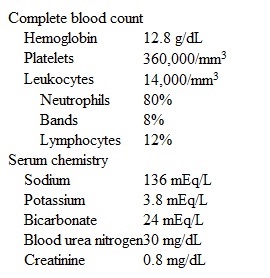A 54-year-old man comes to the emergency department due to worsening epigastric and retrosternal chest pain, nausea, and vomiting. The patient started having severe nausea, retching, and forceful vomiting after eating some spicy food and consuming a small amount of alcohol with dinner several hours ago. The vomitus contained ingested food particles, but the most recent episode included a small amount of bright red blood. The pain has progressively worsened, and he now has pain while swallowing and mild shortness of breath. The patient has had dyspeptic symptoms in the past, which he self-treated with over-the-counter antacids. He does not use tobacco or illicit drugs. He appears pale, diaphoretic, and in moderate distress. Temperature is 38 C (100.4 F) , blood pressure is 140/90 mm Hg, pulse is 120/min, and respirations are 24/min. Neck veins are flat. Dullness to percussion and decreased breath sounds are present over the left basal area. Abdominal examination reveals epigastric tenderness and decreased bowel sounds. Stool occult blood is positive. Upright chest x-ray reveals a small pleural effusion of the left lung, and ECG shows sinus tachycardia; the imaging results are otherwise unremarkable. The patient continues to have chest pain that radiates to the back and worsens during deep breaths. He appears restless and dyspneic. Blood pressure is now 110/60 mm Hg and pulse is 130/min. Intravenous fluids are administered. Laboratory results are as follows: Which of the following is the most appropriate test for confirming this patient's diagnosis?
Which of the following is the most appropriate test for confirming this patient's diagnosis?
A) Contrast esophagogram with water-soluble contrast
B) CT scan of the abdomen with oral contrast
C) Esophageal manometry and pH study
D) Lateral soft tissue neck radiography
E) Upper gastrointestinal endoscopy
Correct Answer:
Verified
Q241: A 38-year-old woman comes to the office
Q242: A 65-year-old man comes to the emergency
Q243: A 56-year-old man comes to the physician
Q244: A 34-year-old previously healthy man was admitted
Q245: A 52-year-old woman is hospitalized because of
Q247: A 33-year-old Caucasian male presents to your
Q248: A 25-year-old woman comes to the physician
Q249: A 56-year-old man comes to the physician
Q250: A 70-year-old woman comes to the emergency
Q251: A 62-year-old man comes to the office
Unlock this Answer For Free Now!
View this answer and more for free by performing one of the following actions

Scan the QR code to install the App and get 2 free unlocks

Unlock quizzes for free by uploading documents